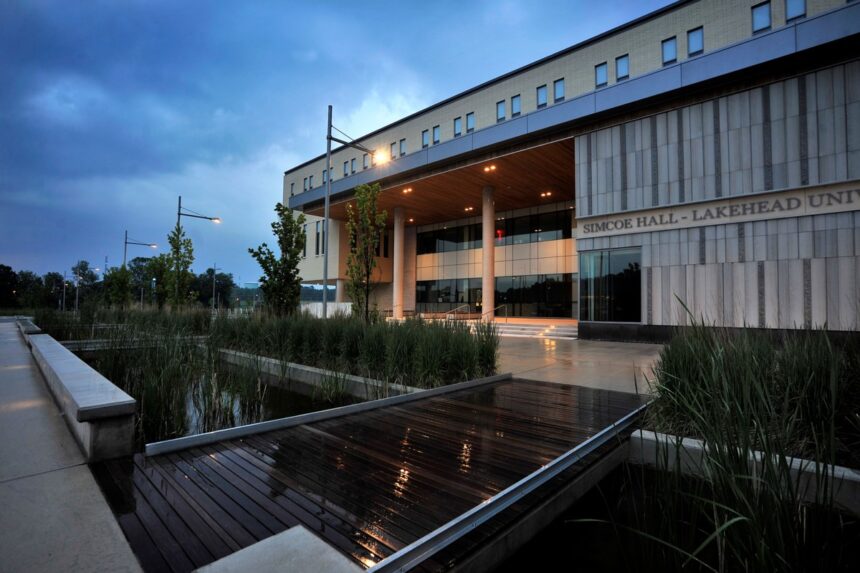As I review the latest global university rankings, I’m struck by a significant achievement from one of our northern Ontario institutions. The Times Higher Education Impact Rankings have just placed Lakehead University among the top 100 universities worldwide – an impressive accomplishment that speaks volumes about Canadian education outside our major urban centers.
The 2024 rankings, released last week, evaluated 1,895 universities across 115 countries, measuring their commitment to the United Nations’ Sustainable Development Goals. Lakehead earned its position through demonstrable action on poverty reduction, gender equity, and community partnerships.
“This recognition validates our strategic approach to sustainability and social responsibility,” says Lakehead President Dr. Moira McPherson, whom I spoke with shortly after the announcement. “Our students and faculty have been working on these initiatives for years, often without the spotlight larger institutions receive.”
The university particularly excelled in categories measuring reduced inequalities and sustainable communities, ranking 23rd and 36th globally in these areas respectively. For context, only four other Canadian universities placed in the top 100 overall, with most being larger institutions from major metropolitan areas.
What makes this achievement noteworthy is Lakehead’s dual-campus model serving Thunder Bay and Orillia – communities that represent the changing face of rural and small-city Canada. The university has become an anchor institution in both regions, where economic transitions have created both challenges and opportunities.
Walking through Lakehead’s Orillia campus last month, I encountered students working on community-based research projects addressing food security in Simcoe County. This hands-on approach appears throughout their curriculum, reflecting what the Times Higher Education evaluators call “actionable learning outcomes.”
According to Statistics Canada data from 2023, mid-sized universities like Lakehead often struggle for recognition despite serving over 30% of Canada’s post-secondary population. These institutions typically receive less research funding per capita than their larger urban counterparts, making Lakehead’s global ranking particularly significant.
The recognition comes at a critical time for Ontario’s post-secondary landscape. Provincial funding models have shifted substantially over the past five years, with performance-based metrics now determining up to 60% of operational funding. International rankings have become increasingly important in this environment, affecting everything from enrollment to research partnerships.
Charles Finnmore, education policy analyst with the Ontario Confederation of University Faculty Associations, notes that “smaller universities often demonstrate remarkable efficiency in translating limited resources into meaningful outcomes. Lakehead’s ranking demonstrates why we need diverse institutional models in our system.”
The rankings evaluated universities through verified data submissions and independent research, focusing on institutional policies, research output, and community impact. Unlike other prominent university rankings that heavily weight research publications and Nobel laureates, the Impact Rankings measure how institutions are actively addressing global challenges.
For Lakehead’s approximately 8,500 students, the recognition validates their choice of institution. Emma Westlake, a fourth-year Environmental Sustainability student at the Orillia campus, told me she chose Lakehead specifically for its community engagement opportunities.
“We’re not just studying these issues in theory – we’re working directly with local organizations to implement solutions,” Westlake explained during a campus sustainability showcase. “That practical experience is invaluable when you’re trying to make real change.”
The university’s Indigenous initiatives also contributed to its strong showing. Lakehead has implemented one of Ontario’s most comprehensive Indigenous content requirements, with all undergraduate students completing courses focused on Indigenous knowledge and perspectives. This approach aligns with several UN Sustainable Development Goals addressing educational equity and cultural inclusion.
Financially, the recognition could prove significant. International student applications tend to be influenced by global rankings, and with Ontario universities increasingly dependent on international tuition revenue, Lakehead’s position may strengthen its recruitment efforts. International students currently make up approximately 15% of Lakehead’s student population, below the provincial average of 22%.
Dr. David Barnett, Lakehead’s Provost and Vice-President Academic, emphasized that the ranking reflects years of strategic planning. “We’ve deliberately integrated sustainability principles throughout our operations and curriculum,” he explained during a recent phone interview. “This isn’t about chasing rankings – it’s about living our institutional values.”
Looking beyond the celebration, challenges remain. Northern and rural universities face persistent issues with student retention, infrastructure funding, and maintaining program diversity with smaller student populations. Transportation connections remain limited, with Thunder Bay’s relatively isolated location creating logistical hurdles for students and researchers alike.
Nevertheless, Lakehead’s global recognition provides a compelling counternarrative to assumptions about where educational excellence exists in Canada. As provincial governments increasingly question the role and funding of post-secondary education, institutions demonstrating measurable impact on their communities may find themselves better positioned to articulate their value.
For communities like Orillia and Thunder Bay, having a globally recognized university creates opportunities for economic development and talent retention. Recent studies from the Conference Board of Canada suggest that mid-sized cities with research-active universities experience lower youth out-migration and higher rates of innovation-based entrepreneurship.
As the fall semester approaches, Lakehead’s admissions office reports increased interest in their sustainability-focused programs. Whether this translates to enrollment growth remains to be seen, but the international recognition has undoubtedly raised the university’s profile at a crucial time for higher education in Ontario.






